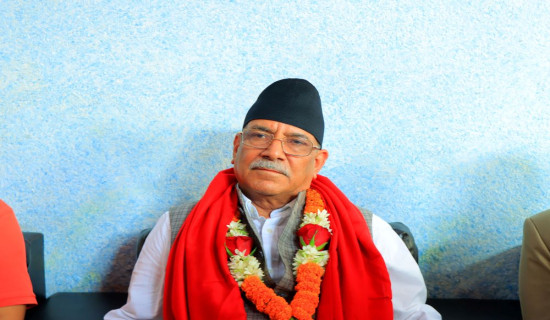- Saturday, 29 June 2024
Borrowing more than capacity invites problems: NRB Governor
By A Staff Reporter,Kathmandu, June 26: Keeping in mind the new generation reform programme introduced by the government through the budget, the Nepal Rastra Bank (NRB) has said that it will introduce the monetary policy for the next fiscal year 2024/25.
Governor of the Nepal Rastra Bank Maha Prasad Adhikari made this remark while speaking at a discussion programme on 'Pre Monetary Policy' organised by the Society of Economic Journalists-Nepal (SEJON) on Tuesday.
Stating that borrowers who take more loans want the monetary policy to be eased, he said that the trend of borrowing more than their capacity would create problems in the economy in the future.
According to him, even though everyone understands the fact that the COVID-19 pandemic is a different situation and it is not appropriate to seek the same kind of facilities, the debtors are still looking for a solution to their debt obligations through the monetary policy.
Monetary policy has its limits and all the problems of borrowers cannot be solved through monetary policy, Adhikari said.
He said that the NRB has adopted a policy of providing loans to agriculture, energy and depreciated sectors as a priority sector as the government has focused on increasing domestic production.
He said that the monetary policy of the NRB for the next fiscal year would address the latest economic situation of the country.
Finance Secretary Madhu Kumar Marasini said that as the government had formulated the budget for the next fiscal year, the objectives and programmes of the budget and the monetary policy for the next fiscal year would be formulated to support the economic growth rate of 6 per cent.
“There is more than Rs. 6 billion investable funds in the banking system and the main demand of the economy is to inject capital, the upcoming monetary policy will focus on that,” he said.
Economist and former vice-chairman of the National Planning Commission Dr. Biswo Nath Poudel said that the bank and financial institutions have sufficient liquidity as they have collected about Rs. 6,200 billion in deposits and provided loans of Rs. 5,100 billion.
He said that there is sufficient liquidity in the banking system but its operation should be in the right direction.
“It is believed that the government should increase spending to keep the economy running during the recent economic contraction. However, due to not expansion of loans, the government has not been able to collect revenue as per the target. This has not solved the current problems of the economy,” said Dr. Poudel.
Sunil KC, president of the Nepal Bankers’ Association, said that there is a continuous attack on the banking sector and it should be stopped.
He said that as the private sector and the banking sector are working together on the same board, the main responsibility of saving the banks lies with the private sector.
According to KC, although it looks like the banks have profit in billions, the distributable profit of more than 10 commercial banks is negative.
Officiating President of the Confederation of Banks and Financial Institutions Nepal (CBFIN) Rajesh Upadhyay said that everyone was watching the monetary policy with great interest.
He said that the market could not accept the reform programme initiated by the NRB.
Sabitri Devi Acharya Adhikari, Associate Professor of Tribhuvan University, emphasised the need to increase government spending.
“Investment in the economy will increase only by increasing government spending. Along with government spending, private investment also increases. At present, the liquidity in the banking system is stockpiled. Recently, the interest rate has decreased without increasing investment. It also seems that our economy is moving in the opposite direction," she said.
President of the Confederation of Nepalese Industries Rajesh Kumar Agrawal said that the interest rate has not decreased in proportion to the increase in the interest rate.
He said that he did not see a situation where the monetary policy of the NRB would be too flexible for the next fiscal year. He emphasised that the base rate should be removed as the NRB's policy rate was not working properly.
















